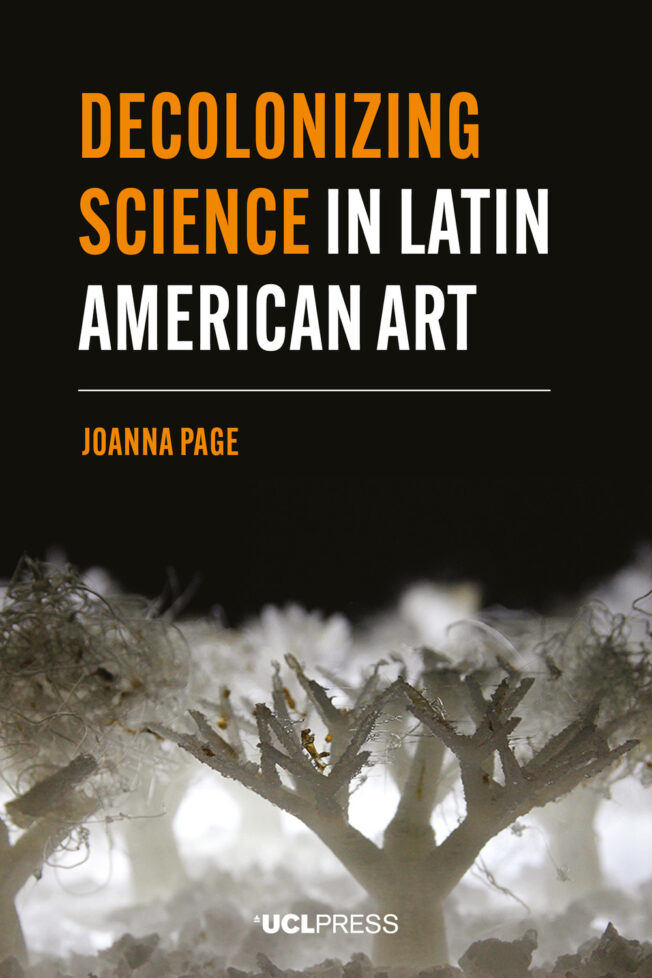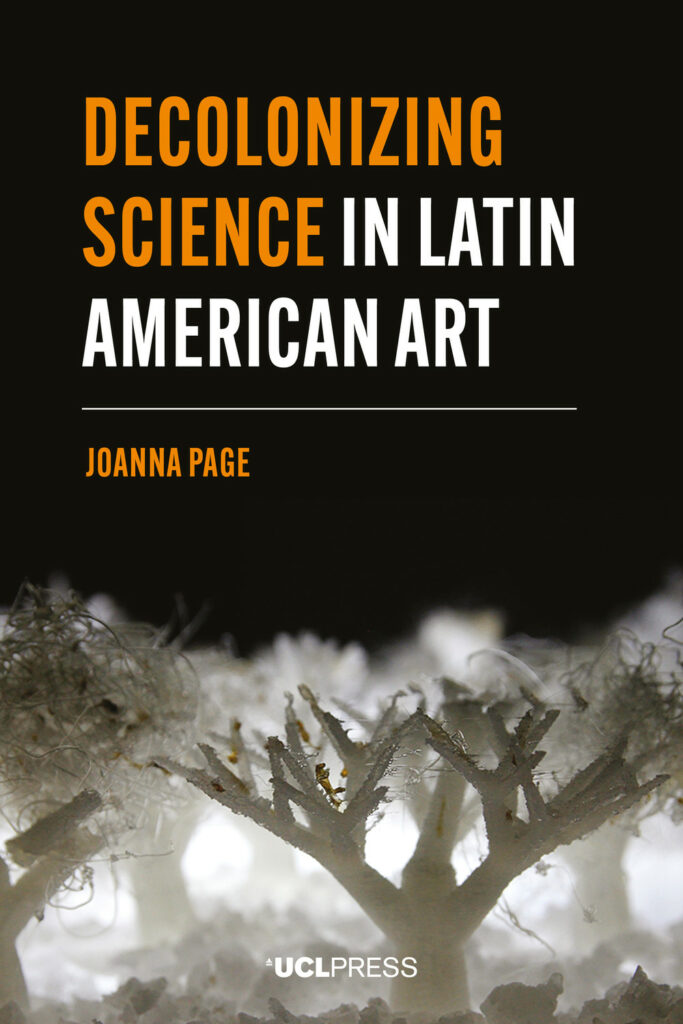
Decolonizing Science in Latin American Art
Joanna Page (Author)
Series: Modern Americas
Projects that bring the ‘hard’ sciences into art are increasingly being exhibited in galleries and museums across the world. In a surge of publications on the subject, few focus on regions beyond Europe and the Anglophone world. Decolonizing Science in Latin American Art assembles a new corpus of art-science projects by Latin American artists, ranging from big-budget collaborations with NASA and MIT to homegrown experiments in artists’ kitchens.
While they draw on recent scientific research, these art projects also ‘decolonize’ science. If increasing knowledge of the natural world has often gone hand-in-hand with our objectification and exploitation of it, the artists studied here emphasize the subjectivity and intelligence of other species, staging new forms of collaboration and co-creativity beyond the human. They design technologies that work with organic processes to promote the health of ecosystems, and seek alternatives to the logics of extractivism and monoculture farming that have caused extensive ecological damage in Latin America. They develop do-it-yourself, open-source, commons-based practices for sharing creative and intellectual property. They establish critical dialogues between Western science and indigenous thought, reconnecting a disembedded, abstracted form of knowledge with the cultural, social, spiritual, and ethical spheres of experience from which it has often been excluded.
Decolonizing Science in Latin American Art interrogates how artistic practices may communicate, extend, supplement, and challenge scientific ideas. At the same time, it explores broader questions in the field of art, including the relationship between knowledge, care, and curation; nonhuman agency; art and utility; and changing approaches to participation. It also highlights important contributions by Latin American thinkers to themes of global significance, including the Anthropocene, climate change and environmental justice.
Praise for Decolonizing Science in Latin American Art
‘The author promotes a post-anthropocentric imaginary and the exquisite artwork selection, embedded in an appropriate theoretical context, is also available as a downloadable pdf.’
Neural
‘[the chapter ‘Art and environmental change: beyond apocalypse’] is innovative through the examples offered, but also through the solutions it offers for building a friendlier environment.’
Research and Education
List of figures Acknowledgements
Introduction
1. A planetary art beyond the human
I. Inhuman agency
II. Seismic encounters and the acoustic sublime
2. The atmosphere as a planetary commons
I. Breathing a common air
II. From the Anthropocene to the Aerocene
3. Art and environmental change: beyond apocalypse
I. Art and geodesign for climate change
II. Environmental futures beyond precarity: symbiosis and resilience
4. Science in an ecology of knowledges
I. Indigenous cosmologies and cognitive justice
II. Transgenic maize: between the milpa and the monoculture
5. Interspecies communication and performance
I. Plantbots and the logic of vegetal life
II. The language of cetaceans
III. Microbe music
6. Revising systems art: biological time and the ethics of care
I. Slow robotics and the art of bioremediation
II. Curation and care
7. Sensory worlds and the pluriverse
I. Spider/webs: from connection to coevolution
II. Myrmecology and multispecies communities
Conclusion
Bibliography
Index
DOI: 10.14324/111.9781787359765
Number of illustrations: 41
Publication date: 15 April 2021
PDF ISBN: 9781787359765
EPUB ISBN: 9781787359796
Hardback ISBN: 9781787359789
Paperback ISBN: 9781787359772
Joanna Page (Author) 
Joanna Page is Reader in Latin American Literature and Visual Culture at the University of Cambridge. Her most recent books are Posthumanism and the Graphic Novel in Latin America (co-authored with Edward King) and Geopolitics, Culture, and the Scientific Imaginary in Latin America (co-edited with María del Pilar Blanco).
‘The author promotes a post-anthropocentric imaginary and the exquisite artwork selection, embedded in an appropriate theoretical context, is also available as a downloadable pdf.’
Neural
‘[the chapter ‘Art and environmental change: beyond apocalypse’] is innovative through the examples offered, but also through the solutions it offers for building a friendlier environment.’
Research and Education
Related titles
Decolonizing Science in Latin American Art
Projects that bring the ‘hard’ sciences into art are increasingly being exhibited in galleries and museums across the world. In a surge of publications on the subject, few focus on regions beyond Europe and the Anglophone world. Decolonizing Science in Latin American Art assembles a new corpus of art-science projects by Latin American artists, ranging from big-budget collaborations with NASA and MIT to homegrown experiments in artists’ kitchens.
While they draw on recent scientific research, these art projects also ‘decolonize’ science. If increasing knowledge of the natural world has often gone hand-in-hand with our objectification and exploitation of it, the artists studied here emphasize the subjectivity and intelligence of other species, staging new forms of collaboration and co-creativity beyond the human. They design technologies that work with organic processes to promote the health of ecosystems, and seek alternatives to the logics of extractivism and monoculture farming that have caused extensive ecological damage in Latin America. They develop do-it-yourself, open-source, commons-based practices for sharing creative and intellectual property. They establish critical dialogues between Western science and indigenous thought, reconnecting a disembedded, abstracted form of knowledge with the cultural, social, spiritual, and ethical spheres of experience from which it has often been excluded.
Decolonizing Science in Latin American Art interrogates how artistic practices may communicate, extend, supplement, and challenge scientific ideas. At the same time, it explores broader questions in the field of art, including the relationship between knowledge, care, and curation; nonhuman agency; art and utility; and changing approaches to participation. It also highlights important contributions by Latin American thinkers to themes of global significance, including the Anthropocene, climate change and environmental justice.
Praise for Decolonizing Science in Latin American Art
‘The author promotes a post-anthropocentric imaginary and the exquisite artwork selection, embedded in an appropriate theoretical context, is also available as a downloadable pdf.’
Neural
‘[the chapter ‘Art and environmental change: beyond apocalypse’] is innovative through the examples offered, but also through the solutions it offers for building a friendlier environment.’
Research and Education
‘The author promotes a post-anthropocentric imaginary and the exquisite artwork selection, embedded in an appropriate theoretical context, is also available as a downloadable pdf.’
Neural
‘[the chapter ‘Art and environmental change: beyond apocalypse’] is innovative through the examples offered, but also through the solutions it offers for building a friendlier environment.’
Research and Education

